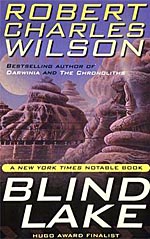
![]() couchtomoon
couchtomoon
8/1/2014
![]()
Back in the days before this blog, and before I had an eReader, I read Stephen King's 2009 release Under the Dome, a story about a small, unassuming town that is mysteriously trapped within its borders. The small town setting provided for multi-character story arcs and formulaic drama. Underwhelmed, but without a blog to convey my thoughts, I left the book on a table at my local university with a post-it note that said, "Free book! It's kind of an okay story!" (By the way, have you heard of bookcrossing.com? It's a great way to NOT HOARD BOOKS.)
Now that I've read Robert Charles Wilson's Blind Lake (2003), I realize it might have inspired King's socially claustrophobic story, as both books share a similar premise with that made-for-TV flavor. And now that King's novel is headed for TV (or already on TV, I never know), Wilson is probably kicking himself for not including a meth lab explosion and gang rape by law enforcement officials.
In Blind Lake, Minnesota, scientists have discovered an unexplained phenomenon that's somehow tied to malfunctioning quantum satellite telescope equipment, which allows them to view activity on another planet located fifty-one light years away. They somehow train the equipment to follow a specific being on this planet, in order for scientists to observe this being's behavior and its interactions with other beings and the environment of the strange planet. Then,something happens to quarantine the small, science-based town from the rest of the world. Without communication with the outside world, the inhabitants of Blind Lake must fend for themselves, although it's not that bad because for some reason they receive a weekly visit from an armored caterer-bot that delivers food, and is guarded by murderous drones… for some reason.
The crisis brings together an unlikely cast of characters, all of whom fit into a winning TV formula:
Strange girl who sees visions? Check.
Her narcissistic father who wants to end the science project? Check.
Her emotionally abused mother who studies the alien? Check.
A journalistic team made up of a fiery, no-nonsense female, a young, but already burned-out failure, and a scholarly mystic? Check.
Blind Lake is best designed for a television miniseries, rather than a novel, and it wouldn't surprise me if Robert Charles Wilson had intended that all along. Tension is stated in dialogue, with lots of name-stating to convey seriousness— "She was right here, Elaine. Playing with that fucking wooden truck. People don't just disappear" (p. 325), and "Don't get lost in the dark, Chris" (p. 324). It's a typical TV trait, because, on television, nuances are difficult to convey without the framework of prose to support a plot. It works for TV, but a reader might get bored by the passive style.
Also like a television show, the characters in Blind Lake are unpacked in entire paragraphs, early in the story, just as if we were watching the character enter a scene. "Elaine was forty-nine years old and immaculate in her safari clothes, a digital imager clipped to her breast pocket and a notebook microphone dangling from the left arm of her zirconium-encrusted sunglasses like a stray hair. Her expression was stern. Elaine was a working science journalist almost twenty years Chris' elder, highly respected in a field where he himself was lately regarded with a certain disdain. He liked Elaine, and her work was top-notch, and so he forgave her tendency to address him the way a grade-school teacher might address the kid who planted the whoopee cushion" (p. 4). This is far different from many highly-regarded SF novels, which require some critical thinking from the reader, in order to piece together the full picture of the characters.
And some character expositions border on the ridiculous. The "bad guy," Ray, a physical scientist, has an obsessive penchant for Ding-Dongs for breakfast, and a hatred for all organic matter, a neurosis we later learn is related to his mother's early death. It's the whole "I hate my mom for dying so now I hate all organic life" disorder. In addition, Ray is mean to his doormat ex-wife, Marguerite, but her boarder-turned-boyfriend teaches her about the signs and dangers of emotional abuse, in a way that is not unlike an after school special. The More You Know…
Some things about the book are okay. "Subject," the alien from fifty-one light years away, is a creature born from Wilson's colorful imagination, with unique reproductive and evolutionary patterns. Even "Subject's" communication style is pretty cool (raspy sounds and wavy follicles from a slit in the torso). Slightly more interesting is the ultimate moral, whichl hinges on Heisenberg's Uncertainty Principle, addressing the effects of Earth-bound observation on the poor and (supposedly) unwitting "Subject." But, for a story that expounds on the morality of pursuing scientific investigation of organic life, the story itself isn't very organic.
Written in this fashion, the whole thing has a corny TV feel. It's almost like the reader can hear the monotone dread note of a TV soundtrack hanging in the background of every scene, which makes it pretty predictable. Mysterious things happen, more mysterious things happen, and everybody but the bad guy (and a few random redshirts) survive. Lots of questions are left unanswered. Why would the government quarantine Blind Lake without any communique? How would a quantum malfunction result in an intelligent Peeping Tom telescope? And, where the hell is the geek with ham radio who could probably find out what's going on outside?
So, like Under the Dome, it's kind of an okay story! Best recommended for passive readers who don't own a television.
http://couchtomoon.wordpress.com